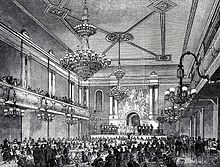Canterbury Music Hall
| Canterbury Hall Canterbury Palace of Varieties Canterbury Theatre Canterbury Theatre of Varieties |
|

Interior of the Canterbury Hall, shown in a print of 1856.
|
|
| Address | 143 Westminster Bridge Road Lambeth, London |
|---|---|
| Coordinates | 51°29′57″N 0°06′48″W / 51.4991°N 0.1134°W |
| Owner | Charles Morton |
| Designation | Demolished |
| Type | Music hall |
| Capacity | 1852 700 seated 1854 1,500 |
| Construction | |
| Opened | 17 May 1852 |
| Closed | 1942 (bomb damaged) |
| Rebuilt | 1852, 1854, 1858 Samuel Field 1876 E. Bridgeman 1890 Frank Matcham 1902 Wylson and Long |
The Canterbury Music Hall was established in 1852 by Charles Morton on the site of a former skittle alley adjacent to the Canterbury Tavern at 143 Westminster Bridge Road, Lambeth. It was the first purpose-built music hall in London, and Morton came to be dubbed the Father of the Halls as hundreds of imitators were built within the next several years. The theatre was rebuilt three times, and the last theatre on the site was destroyed by bombing in 1942.
Morton and Frederick Stanley, his brother in law, purchased the Canterbury Arms, in Upper Marsh, Lambeth, in 1849. Morton was experienced in presenting 'Gentlemen Only' entertainments in his other pubs, and he had been impressed with the entertainments at Evans Music-and-Supper Rooms in Covent Garden and decided to offer a harmonic meeting, held on Saturdays, in the back room of the public house. He brought in smart tables, with candlesticks, allowing audiences to sit and eat comfortably while watching concerts known as 'Sing-Songs' or 'Free and Easys' on Mondays and Saturdays. Soon, a Thursday evening programme was added to accommodate the crowds. Morton encouraged women to attend the entertainments, giving the venue wider appeal than the old time song and supper rooms, which were male preserves. Entry was free, but the profits from the sale of food and drink allowed the construction of a larger hall on the site of the former skittle alley, at the back of the public house.
This 700 seat hall took a year to build and opened as the Canterbury Hall on 17 May 1852, described as "the most significant date in all the history of music hall". The hall charged a modest admission and looked like most contemporary concert rooms within public houses of the period. It specialised in programmes of light music and ballads. Professional performers could earn high fees, and this attracted performances of selections from opera, including the first performances of Jacques Offenbach's music in England.
The venture was profitable, and a new theatre was built in 1856, of unprecedented size, seating 1,500. In order not to interrupt the flow of profits, the theatre was constructed around the walls of the 1852 hall, and when it was complete, the old building within was demolished in a single weekend. This new theatre was the first purpose-built tavern music hall and opened in December 1856, as the New Canterbury Hall.
...
Wikipedia
